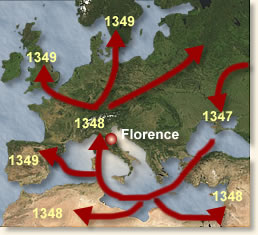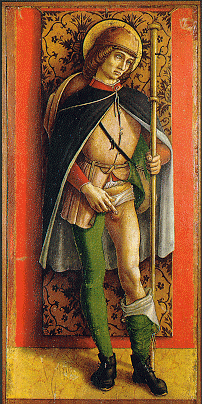Baroque Music: "Today the term baroque has come to refer to a very clearly definable type or genre of music which originated, broadly speaking, around 1600 and came to fruition between 1700 and 1750...
Listen to music of the 1200s and 1300s. It's relatively primitive in terms of melody and harmony. If we move to the 1500s we find a great difference, as Italian music began to blossom and English composers like Dowland, Morley and Tomkins produced the wonderful melodies and surprisingly sensitive poetry which accompanied them - or vice versa. A major theme underlying music at that time however was the exploration of form. There was still so much new to discover: new melodic lines and harmonic progressions to be explored, new combinations of instruments, and new forms in music such as the fugue, canon, and variations on a bassline, a popular tune or a chorale. As the 1600s progressed, so these different musical forms took on definite shape, and the period from 1700 to 1750 can clearly be seen as the 'high baroque'.
Music which is melodious yet so constructed as to reflect the 'perfect order' of the universe: that is the essence of the baroque. In the words of baroque composer and theorist Johann Joseph Fux: 'A composition meets the demands of good taste if it is well constructed, avoids trivialities as well as willful eccentricities, aims at the sublime, but moves in a natural ordered way, combining brilliant ideas with perfect workmanship.'" (from Baroque Music)
Classical Music: "The Classical period in Western music occurred from about 1730 to 1820, despite considerable overlap at both ends with preceding and following periods, as is true for all musical eras. Although the term classical music is used as a blanket term meaning all kinds of music in this tradition, it can also occasionally mean this particular era within that tradition.
The Classical period falls between the Baroque and the Romantic periods. Probably the best known composers from this period are Wolfgang Amadeus Mozart and Ludwig van Beethoven... Beethoven is also regarded either as a Romantic composer or a composer who was part of the transition to the Romantic...
In the middle of the 18th century, Europe began to move to a new style in architecture, literature, and the arts generally, known as Classicism. While still tightly linked to the court culture and absolutism, with its formality and emphasis on order and hierarchy, the new style was also a cleaner style, one that favored clearer divisions between parts, brighter contrasts and colors, and simplicity rather than complexity." (from Wikipedia)
Romantic Music: "The era of Romantic music is defined as the period of European classical music that runs roughly from the early 1800s to the first decade of the 20th century, as well as music written according to the norms and styles of that period. The Romantic period was preceded by the classical period, and was followed by the modern period." (from Wikipedia)
"The main difference between Classical and Romantic music came from attitudes towards these rules. In the eighteenth century, rules were rules. In a sonata, for example, each prescribed section would be where it belonged, the appropriate length, and in the proper key. In the nineteenth century rules, boundaries and limits were not to be followed so much as they were to be explored, tested, and even defied. For example, the first movement of a Romantic sonata may contain all the expected sections as the music develops, but the composer might feel free to expand or contract some sections or to add unexpected interruptions between them..." (from The Music of the Romantic Era)
Romanticism: the 19th-century movement which placed an emphasis on man's emotions, and advocated a love of nature (c.f. Constable, Turner, etc.), beauty (the Impressionists, Aesthetes, etc.), the exotic (c.f., Monet, Gaugin, etc.), the non-rational (c.f. Munch, Freud), and a glorification of the past (c.f. pre-Raphaelites, but also incl. nationalism - c.f., Goya, Gericault, Delacroix, Wagner, Verdi, etc.)
Positivism: the 19th- and 20th-century belief that the world could be truly understood and that society could be improved only though the strict application of science. (C.f., Darwin, Freud, Currie, Seurat, etc.)
Decadence: a reaction by some to Positivism; an outgrowth of late Romanticism (also called Symbolism) which desired to explore what was believed to be the darker, more extreme human experiences and the occult. Often characterized by moods of ennui (depressed boredom), nostalgia, and/or a sense of loss or isolation.
"Sin is no sin when virtue is forgot.
It is so good in sin to keep in sight
The white hills [meaning innocence] whence we fell, to measure by...
Ah, that's the thrill!...
First drink the stars, then grunt amid the mire."
Victorianism: the famous 19th-century middle-class discomfort with the body and its needs. The term "Victorian" thus comes to be used for someone who is easily embarrassed and repressed about these things, and most particularly about sex. (C.f., reaction of Freud, Klimt, etc.)
 (Outbreak of the Black Death, 1347-1352)
(Outbreak of the Black Death, 1347-1352)







